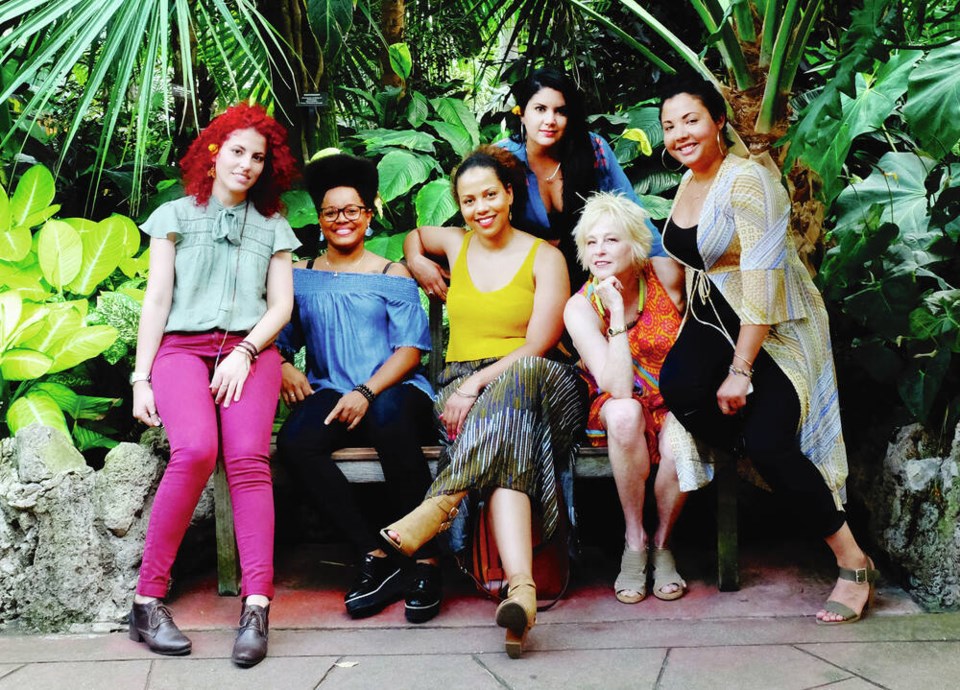JANE BUNNETT & MAQUEQUE
Where: Hermann’s Upstairs, 751 View St.
When: Saturday, Oct. 21, 9 p.m. (doors at 8)
Tickets: $45.50 from the Royal McPherson (250-386-6121) and rmts.bc.ca
While some artists are happy to work in a stylistic silo, Toronto-born Jane Bunnett is obsessed with exploration.
“The people who are interested in jazz and world music are really into it,” Bunnett, 66, said. “But the artists would be the first ones to say, ‘I’d like a bigger audience.’ Don’t just preach to the people who already know all about you. Try and break some ground.”
Bunnett dabbles in jazz and world music, and excels on both flute and alto saxophone. She’s a band leader (of the all-female group, Maqueque) and band member in various projects, including one with jazz singer Laila Biali that will be at the McPherson Playhouse on Dec. 15.
A performance by Bunnett and Maqueque is up first, however. The Grammy-nominated group (pronounced Mah-Keh-Keh) is performing tonight at Hermann’s Upstairs, its first appearance at the View Street venue since 2018.
Bunnett and her bandmates will be armed with songs from the group’s latest recording, Playing With Fire. In typical Bunnett fashion, the album bridges genres with ease, and pairs musicians from Zimbabwe, the Dominican Republic and Latin America together with ones from Spain and Lebanon.
Bunnett and her husband, trumpeter Larry Cramer, began pulling away from post-bop jazz and exploring the music of Cuba in 1991, with the release of Spirits of Havana. The album won the Juno Award for best world beat recording, and Bunnett has never looked back.
“For that album, we brought many, many musicians from Cuba to tour with us in Canada, the United States, and Europe, and did that for a good 25 years.”
A recurring theme during that era, Bunnett said, was the lack of women in those lineups. “I kept meeting all these young ladies at the conservatory in Cuba, who were so talented. But I’d be on a jazz festival in Cuba, and I wouldn’t see any of them playing. They were sitting on the sidelines.”
Bunnett has bona fide jazz chops; she studied in New York under be-bop pianist Barry Harris, and took lessons in Toronto from legends such as saxophonist James Moody and flautist Frank Wess. But it wasn’t until 2014 she moved into her current format, when Cramer pushed Bunnett into acting on her interest in Cuban jazz.
She returned to Cuba on a search for young women who had the desire, technique, and personality to buck convention and join an all-female Afro-Cuban jazz group that would tour internationally. That is when Maqueque was born.
The majority of performers in the group today are graduates of the Cuban conservatory. Bunnett said she handles all the paperwork with attorneys and Canadian embassies in the native countries of its members so the band can travel freely, under the umbrella of cultural activity.
That is much easier to accomplish today than it was 10 years ago. But while some of the band members have left Cuba — drummer Yissy Garcia lives in Miami, Florida, while bassist Tailin Marrero is in Monterey, California — Bunnett is still required to balance her on-stage duties with mounting off-stage ones, including managing an expanding pool of fill-in musicians.
“That’s the thing I’m finding now, with the band. The complications of travel visas, with Cuban musicians now living in the U.S., is that they have to work. They still love playing with Maqueque, but if something comes up before I get a date [for them], they are going to accept it.”
Playing With Fire finds Bunnett and Co. in fine form and swinging for the fences on reworking of songs by two modern jazz giants, pianist Bud Powell and bassist Charles Mingus, in addition to a host of originals. The group still operates as a loose democracy, even though Bunnett occupies a larger leadership position than her peers.
That’s what gives Maqueque a head start on the competition. Collaboration remains one of Bunnett’s top priorities.
“I wrote most of the material on the new record, but the various members all contributed music. We workshop it, so when someone brings in a piece, we work on it, and everybody contributes ideas. It’s no longer just your piece, it is everybody’s. They all add something to it.”



